Статьи журнала - Arctic and North
Все статьи: 972
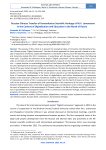
Статья научная
The purpose of this article is to present the conceptual ideas of innovative interdisciplinary Russian-Chinese project “Digital Lomonosov”, the idea of which appeared five years ago and is based on a decade of experience of Chinese studies development in the North of Russia and at the Northern (Arctic) Federal University named after M.V. Lomonosov. In accordance with the goal, the work solves the following main tasks: 1) justifies the relevance of the project “Digital Lomonosov” and its demand in China; 2) provides an overview of scientific works and interdisciplinary research on the humanitarian ideas of Lomonosov — a great scientist, an outstanding personality of the Russian North; 3) summarizes the main results of ten-year development of Chinese studies in the North of Russia and at NArFU; 4) briefly presents the experience of five-year network project of federal universities as the basis for developing the concept of innovative Russian-Chinese project; 5) outlines the prospects for the project and the promotion of Lomonosov Studies in China. The methodology of the review article is based on an interdisciplinary vision of the directions of humanities development in the focus of digitalization and further development of Lomonosov Studies in the interaction of Russian and Chinese scholars. The authors substantiate a new conceptual idea of international transfer of M.V. Lomonosov’s heritage digitally from the North of Russia to China. The results of the analysis are summarization and systematization of the experience of five years of cooperation between federal universities in the field of applied linguistics and education in the context of digitalization, ten years of experience in the development of Chinese studies in the North of Russia and NArFU, actualization of possibilities of international transfer of M.V. Lomonosov humanitarian heritage, and presentation of prospects of Lomonosov Studies in China.
Бесплатно
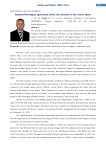
Russian-Norwegian agreement about the division of the Arctic space
Статья научная
The article reveals a complex, time-consuming process of normalization of relations between Russia and Norway on the delimitation of the Arctic spaces. Particular attention is paid to the legal analysis of the provisions of the International Treaty of Paris of Svalbard and the agreement signed between Russia and Norway concerning the delimitation of maritime areas in 2010.
Бесплатно
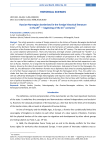
Статья научная
The article presents a review of foreign research on the history of Russian-Norwegian borderland in 16th — early 20th centuries. The dominance of the empirical positivism and historical nationalism in the history of the Northern frontier delimitation led to the formation of relatively stable and unilateral interpretations of the Russian-Norwegian border in the first half of the 20th century. The state was perceived as an a priori objective phenomenon. That’s why historians and legal scholars understood the “border” as a static instrument of political power, ignoring its multipotential phenomena and variety of its subjects. The Scandinavian historiography has developed a historical tradition of perception of the Treaty 1826 on the delimitation of “common districts” as a fair act of institutionalization of borders over the common possession. As a part of this tradition, it may seem that Norwegian territorial claims did not look expansive in relation to Russia. However, for a long time the Scandinavian historians advocated the theory that the Russian Empire, driven by the idea of permanent territorial extensions, had posed a threat to the Norwegian Finmark. So, the delineation of the Northern frontier was a diplomatic deal aimed at creating legitimate barriers to further Russian expansion in Western Europe through the Norwegian Arctic. Thus, the author con-cludes that from the methodological perspective, the evolution of the Russian-Norwegian borderlands is still not sufficiently developed in foreign historiography and requires closer attention to create high-quality reconstruction of the Russian-Norwegian borderland evolution from the territory with frontlines configura-tion of political boundaries in the 13th century — the early 19th century to the space with a sealed political boundary in the 20th century.
Бесплатно
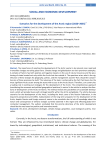
Scenarios for the development of the Arctic region (2020–2035)
Статья научная
The importance of selecting the development of the Arctic seems to be relevant since rapid and irreversible changes are taking place there. Climate change and globalization are their prominent examples. A complex of factors has both positive and negative impacts on the use of natural resources and the positioning of states located not only within the Arctic but also outside it. The questions arise: what is the significance of these changes for geography, politics, and the management system? How should the comprehension of these processes be built? The relevance of the topic is enhanced by the fact that Russia has the most significant Arctic sector among the states with access to the Arctic Ocean. Therefore, our country has a leading role in working out strategies for the development of the Arctic. The comprehensive approach (considering the economic and political-geographical positions) is central in the article to analyze the directions of development of the Arctic territories. The method reveals the possibilities of sustainable development, which will provide Russia with strategic benefits within the Arctic and globally. The article discusses scenarios for the development of the Arctic, including the Arctic zone of the Russian Federation, in the long-term perspective (until 2035). Substantiation of the long-term prospects for the development of the Arctic, despite Russian and foreign research, seems to be unrealistic due to lack of knowledge about the nature and consequences of climatic changes currently observed in this region and affecting global environmental management. The authors concluded that the priority directions of the Arctic development should be the ones based on positive and innovative trends.
Бесплатно
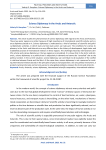
Science Diplomacy in the Arctic and Antarctic
Статья научная
The article studies the phenomenon of science diplomacy with regard to the Arctic and Antarctic. These two polar regions are similar because of high importance of international scientific activity and science diplomacy based on it. Science diplomacy is understood as a kind of synthesis of scientific and political-diplomatic activities, in which state and non-state actors can take part. The conditions for science diplomacy in the Arctic and Antarctic are very different due to the history of development, legal status and established practice of international relations in these regions. The challenges faced by international scientific activity and science diplomacy in the two regions are considered. It is shown that in the Arctic and Antarctic, science diplomacy as a political tool is objectively in demand and cannot be “cancelled” due to the political context. In the current situation, science diplomacy can contribute to de-escalation of the conflict in relations between Russia and the West. At the same time, science diplomacy is not a panacea for creating international relations based on the principles of peace and cooperation. Like any political instrument, it protects national interests and not only serves to solve global problems arising in the Arctic and Antarctic.
Бесплатно
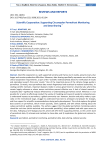
Scientific Cooperation: Supporting Circumpolar Permafrost Monitoring and Data Sharing
Статья научная
Scientific cooperation is a well-supported narrative and theme, but in reality, presents many challenges and counter-productive difficulties. Moreover, data sharing specifically represents one of the more critical cooperation requirements, as part of the “scientific method [which] allows for verification of results and extending research from prior results.” One of the important pieces of the climate change puzzle is permafrost. Currently, most permafrost data remain fragmented and restricted to national authorities, including scientific institutes. Important datasets reside in various government or university labs, where they remain largely unknown or where access restrictions prevent effective use. A lack of shared research—especially data—significantly reduces effectiveness of understanding permafrost overall. Whereas it is not possible for a nation to effectively conduct the variety of modeling and research needed to comprehensively understand impacts to permafrost, a global community can. However, decision and policy makers, especially on the international stage, struggle to understand how best to anticipate and prepare for changes, and thus support for scientific recommendations during policy development. This article explores the global data systems on permafrost, which remain sporadic, rarely updated, and with almost nothing about the subsea permafrost publicly available. The authors suggest that the global permafrost monitoring system should be real time (within technical and reasonable possibility), often updated and with open access to the data. Following a brief background, this article will offer three supporting themes, 1) the current state of permafrost data, 2) rationale and methods to share data, and 3) implications for global and national interests.
Бесплатно

Scientific and educational space of the Arctic: Norway
Статья научная
The analytical overview represents the scientific and educational potential of the Norwegian territories of the Circumpolar Region (Svalbard, Finnmark, Troms and Nordland), Norway's science and innovation policy and scientific interests in the Arctic.
Бесплатно
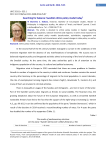
Searching for balance: Swedish ethnic policy model today
Статья научная
The article is devoted to ethnic policy models in Sweden regarding indigenous population, national minorities and migrants. It seems most important to analize the ethnic policy models (acculturation, assimilation, segregation and integration policy) and circumstances which caused changes in state policy, as well as the efficiency in conditions of the modern crisis situation.
Бесплатно
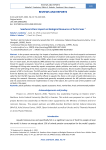
Seashore Litters Impact on Biological Resources of Arctic Seas
Статья научная
In the present manuscript, the impact of seashore plastic litter on the Arctic aquatic environment with a primary focus on fish is discussed. Plastic pollution of seashore and aquatic ecosystem became a major environmental problem in the late 1990s, when it was considered as a major threat for aquatic ecosystem. In recent years, the microplastic (MP) pollution has raised scientific attention and awareness as severe threat for aquatic ecosystem. Since fish is a significant source of food and wealth of Arctic countries, the shrinkage of fishing rates caused by aquatic ecosystems plastic pollution can lead to a significant negative effect on the well-being of the Arctic countries’ population and economy. Recent studies showed significant amount of MP in Arctic seas. The MP particles were found in more than 90% of the studied water samples from the Barents Sea. This indicates that MP has become a major threat for aquatic life in the Arctic. Despite the fact the MP may pose harmful effects to aquatic life, there is still a lack of valid information concerning this research. Moreover, standard and generally accepted protocols for MP pollution monitoring and risk assessment need to be implemented. In view of the above, the current state of the problem is described in this paper.
Бесплатно
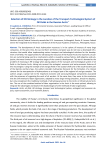
Статья научная
The development of Arctic hydrocarbon resources is in the sphere of interests of many large companies. At the same time, the vast northern territories and polar seas do not have a developed infrastructure that would allow implementing various transport and technological solutions for the development of oil fields. The opportunities for attracting the resources of the Russian Arctic into economic circulation are currently being used to a small extent, which is caused by various factors, both objective and subjective, that were formed at the previous stages of the country's development. This work is devoted to the problem of choosing an HR strategy when placing objects of the transport and technological system of oil fields in the Russian Arctic, taking into account the ecological, economic and socio-economic features of this macroregion. Using the example of oil and gas fields in the coastal-shelf zone of the south-eastern part of the Barents and Kara Seas, the authors consider multivariate forecasts for the formation of a rational scheme for the transportation of hydrocarbons as an integral part of the regional oil and gas complex. The authors assign a special role to the important economic and socio-psychological components associated with the processes of organizing the work of oil workers. At the same time, they come to the conclusion that the shift method of labor organization, adopted by many large mining companies, should not displace, but only complement the traditional methods of attracting personnel to the Arctic oil infrastructure facilities. The use of the combined method of labor organization in the Arctic is the most optimal, allowing to integrate the advantages and localize the disadvantages of other methods of labor organization.
Бесплатно
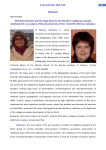
Статья научная
The paper gives a brief description of the bibliographic database of the State Public Scientific-Technological Library of the Siberian Branch of the Russian Academy of Sciences (SPSTL SB RAS), generated for the information support of the topic "Indigenous peoples of the North". It was presented the bibliometric (logical-statistical) analysis of the documents selected from the database relating legal bases of development, self-development and self-determination of northern indigenous peoples of the Russian Federation and the world. The authors examined the temporal, typical, geographical, and language structures of the information flow, revealed socalled "nuclear" group of periodicals, characterized by high publication activity on this issue, mentioned the most important scientific events, where this problem was discussed by scientists and specialists, presented the recent monographs entering the library collection on the legal basis of the indigenous peoples development at the Far North.
Бесплатно
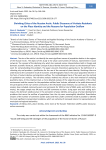
Статья научная
The aim of the article is to identify the most significant causes of population decline in the regions of the Russian Arctic. The object of this study is the urban communities of Vorkuta, represented in social networks. The concept of the declining city, which has received various interpretations both in foreign and domestic scientific literature, and the concept of place identity have been chosen as the theoretical framework for comprehending the problem. The paper presents theoretical approaches to the definition of a shrinking city and provides a justification for the use of the concept of place identity. Shrinking cities are understood as the cumulative result of economic and demographic factors that cause population decline in the form of natural decline and migration outflow. The methodological basis of the work was the method of qualitative text analysis. The narrative analysis method was chosen as the main method of analyzing qualitative data. At the empirical level, a more detailed analysis of the subjective perception of the urban environment and the reasons for the population outflow from Vorkuta, reflected in the public discourse of the participants of the city’s online community in the VKontakte social network, was carried out. The initial analysis base included community posts and comments for 2022 (a total of 9032 posts and 191733 comments), the target sample was 64 posts and 366 comments to them. Using open and axial coding techniques, the dominant subdiscourses in the perception of place identity and a group of urban development problems that cause the outflow of population from the city were meaningfully identified. Quantitative analysis of the number of comments (under posts) and likes (under comments) made it possible to identify the most significant and persistent problems, which are certainly of increased interest to representatives of municipal and regional authorities.
Бесплатно
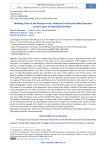
Статья научная
The purpose of the article is to determine the most significant causes of population decline in the regions of the Russian Arctic. The object of the study was the urban population of the subjects of the Russian Arctic. The concept of a shrinking city, which has received various interpretations both in foreign and domestic scientific thought, was chosen as a theoretical framework for understanding the problem. In this article, the shrinkage of cities is understood as a cumulative result of economic and demographic factors that cause population decline in the form of natural loss and migration outflow. On the basis of statistical data, a steady demographic decline was recorded in the cities of the subjects of the Russian Arctic. This made it possible to confirm the validity of the use of this concept in relation to these territories. Based on the materials of domestic and foreign studies, the most general, systemic factors of population decline in the regions of the Russian Arctic were identified, such as: the historical context and the policy of Soviet industrialization, the specifics of the local (regional) identity of the inhabitants of the northern territories, global demographic trends. At the empirical level, a more detailed analysis of the subjective perception of the reasons for the outflow of the population from the Murmansk Oblast, reflected in the public discourse of the participants of the online community of the city of Murmansk in the social network VKontakte, was carried out. The initial analysis base included posts and comments of the community for 2021-2022 (a total of 23.817 posts and 926.583 comments), the target sample included 268 posts and 2621 comments. Open and axial coding techniques were used to identify three groups of urban development issues as causes of the outflow of population from the region: 1) natural and climatic conditions, 2) quality of life, 3) prospects for the development of the city. Quantitative analysis of the number of comments (under posts) and likes (under comments) allowed us to identify the most significant and persistent problems, which, of course, are of increased interest to representatives of municipal and regional authorities.
Бесплатно
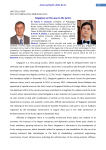
Singapore on the way to the Arctic
Статья научная
Singapore’s Arctic interests and needs are analyzed. If China, Japan and South Korea consider the Arctic as a source of oil and gas, Singapore is interested not so much in the mineral resources of the region, but in the use of their technologies for their production. For Singapore, the Arctic is a platform on which its innovation and technology can find a place. Singapore has achieved the status of a permanent observer in the Arctic Council, which for him is a convenient position for careful monitoring of Arctic political changes.
Бесплатно
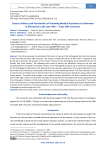
Статья научная
The article examines the activities of the sisters of mercy of the Arkhangelsk Red Cross Community in the late 19th and early 20th centuries. The authors compare the forms of their work in peacetime and during wars. Based on the analysis of the annual “Reports of the Arkhangelsk Local Administration of the Russian Red Cross Society”, the following main areas of activity are identified: caring for the sick and wounded (both in hospitals and medical centers in the Arkhangelsk province and at the front), fundraising for the Arkhangelsk institutions of the Russian Red Cross Society, organization of a surgical hospital for children under the Community, training and certification of junior medical personnel. Particular attention is paid to the provision of medical care to Russian fishermen on the Murmansk coast during the spring and summer fishing season. The quality and changes in the medical services provided in the Arctic climate in the early years of the 20th century are analyzed. Examples of the activities of the medical and sanitary detachment of the Arkhangelsk institution of the Russian Red Cross Society in Kiberg (Norway) are presented. The novelty of the study consists in a comprehensive analysis of the initial stage of the medical and sanitary detachments’ activities and the specifics of training medical personnel to provide seasonal medical care to residents of the Arkhangelsk province going out to fish.
Бесплатно
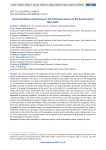
Small and Medium-Sized Towns in the Settlement System of the Russian North: 1939–2020
Статья научная
The article examines the settlement system of the Russian North, which was previously determined by decisions of ministries and departments, and now it is changing under the influence of resource corporations' activities. The focus is on small and medium-sized towns that are part of the supporting framework of settlement, ensuring connectivity of the northern territories. The authors analyze the dynamics of population, including urban one, and the population of small and medium-sized cities. The study identifies periods of upward and downward dynamics for each population group and settlements. If the country is drawing the population to the west, then in the North it is concentrated in the Asian part. The article shows that urban settlements were created multifunctional, with the monopoly of a city-forming enterprise, which, on the one hand, made them economically vulnerable, and on the other hand — more adaptable to external conditions. According to the author's methodology, small and medium towns are ranked according to the share of the population of these cities in the total population of the region. The authors have identified four groups of regions that have an insufficient, medium, high and excessive share of the population of small and medium towns; the optimal boundaries of this share are proposed. The authors have identified four groups of regions that have an insufficient, medium, high and excess share of the population of small and medium towns; the optimal boundaries of this share are proposed. The study revealed the similarity (concentration of the population in large cities) and the difference in the structure of settlements in the North (the share of the population living in small and medium urban settlements, is lower in the countryside). The research results will be applied in the development of strategic documents for the development of northern towns.
Бесплатно
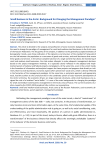
Small business in the Arctic: background for changing the management paradigm
Статья научная
The article is devoted to the analysis and justification of socio-economic background that initiates the need to change the paradigm of management for small and medium-sized businesses in the Arctic zone of the Russian Federation. The key points of this analysis, in addition to the generally accepted estimates of demographic trends, were those indicators of the dynamics and structure of the standard of living which are the link between the population as a consumer of goods and services, and small businesses that create these goods and services. In the almost complete absence of a single content that allows full monitoring of small and medium-sized businesses, the state makes attempts to make adequate management decisions based on the project management methods. It is especially clearly reflected in the adopted and implemented system of national and federal projects and programs. At the same time, even in the current trends in the formation of information and analytical support for these projects and programs that directly or indirectly relate to small businesses, economic aspects often prevail over social ones, which is directly reflected in the formation of the management paradigm. At the same time, a systematic approach and appropriate tools, lead the authors to the conclusion that in the coordinate system of socio-economic development of the Arctic territories, the economic drivers are large corporate structures, while small businesses are assigned the role of a localized “social buffer”. It is one of the main backgrounds for changing the paradigm for small and medium-sized business management in the Arctic areas of Russia. The current economic situation caused by the COVID-2019 pandemic fully confirms our assumptions.
Бесплатно
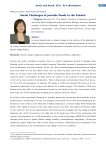
Social Challenges of periodic floods in the Yakutia
Статья научная
In recent decades due to climate change in the territory of the Republic of Sakha (Yakutia) increases the number of flooded settlements. In this article author research addresses problems of social adaptation of people which live in the annually flooded village Kyllah.
Бесплатно
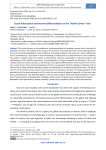
Social Polarization and Income Differentiation on the “North-Center” Axis
Статья научная
The article focuses on the problem of social polarization in the global context and on the level of particular countries. The subject of the study is the economic and social parameters of functioning mechanisms of territorial development in the conditions of existing instability and social risk. Income differentiation is considered as a key factor of social distancing of society and as a determinant of social instability. The authors compare data from reports of international economic organizations, statistical bulletins and publications of the scientific community. The proportions of income inequality are analyzed in the cross-country and intra-country contexts; as an example, the regional differentiation of the Russian Arctic territories, as well as the urban and rural population of China, are assessed. Dynamic changes in absolute and relative terms of living standard indicators confirm the hypothesis of increasing social polarization. The development of the Russian Arctic territories demonstrates an imbalance between the living standards of the population and the perceived quality of life, while the main trends of regional inequality in China have clear group characteristics. The identified patterns can be used to adjust social and regional policies, to determine the parameters of development strategies and the content of government programs and projects.
Бесплатно
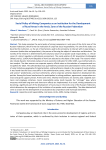
Статья научная
This study examines the social policy of mining companies in rural areas of the Arctic zone of the Russian Federation, which forms the institution of corporate social responsibility. The aim of the study is to describe this institution, i.e. the set of mechanisms used by the enterprise to interact with its operating environment (authorities and population), the process of forming the object of interaction and directions. The novelty of the research is determined by the voluntary nature of corporate social responsibility, i.e. the absence of a direct regulatory institutional environment. The social policies of JSC Severalmaz (Arkhangelsk Oblast) and LLC LUKOIL-Komi (Republic of Komi) are selected as the object of the study. The research methods include dynamic horizontal analysis of socio-economic indicators for 2012–2023, case method and content analysis. The data sources are corporate reports, official notes on the websites of companies and municipalities for 2023. The collected data was quantitatively assessed and systematized in terms of the areas of social initiatives, geography of implementation, and beneficiaries. Based on the analysis of social activities, it was found that the focus areas differ in the administrative center, where “social sphere” and “education and science” predominate, and rural settlements, where corporate activities depend on development disparities. Among the formal mechanisms for participation in solving problems, agreements, cooperation contracts and grant support prevail. At the same time, informal mechanisms are actively used: targeted assistance and employee initiatives. Social responsibility policy tends towards the “strategic” type, where measures with both long-term and short-term effects are implemented. As a result, mining companies are becoming a significant part of the development of rural areas in the Arctic zone of the Russian Federation, which determines the emergence of the institution of corporate social responsibility. The data obtained will serve as a basis for the development of social policies by corporations and municipal authorities.
Бесплатно

